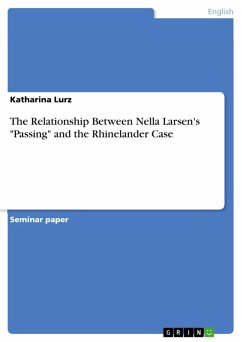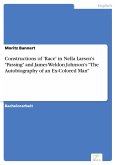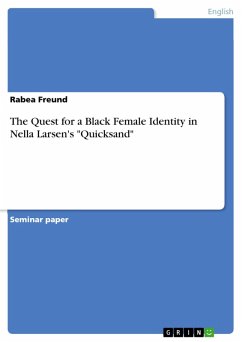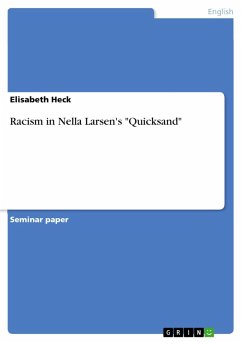Seminar paper from the year 2018 in the subject American Studies - Literature, grade: 1,3, University of Münster (Englisches Seminar), language: English, abstract: This paper examines the roots of Black Bourgeoisie in Franklin E. Frazier's book "Black Bourgeoisie" from 1957 and addresses its role in the novel "Passing" by Nella Larsen. Franklin E. Frazier's book is still one of the most important analysis of African American life. It traces the upcoming and the development of the black middle class from the separated South to the after-war period in the North. He asserts how African Americans in the middle class lost their roots and traditions instead of gaining the wished acknowledgment of their white counterparts. Frazier presents the losing of their identities and an inferiority complex they cannot escape as a result. Until today Frazier's remarks on the black bourgeoisie are still relevant to many other authors engaging in the topic of the African American middle class. His findings and considerations are often being referred to in other works, they are worshiped as well as reviled. Reading some of these works regarding Frazier's early work, it gets clear that in the last decades a lot had changed, especially regarding the position of the blacks in the economy and white society and their feelings towards their black roots. To get a detailed insight into the life of a black bourgeois, it is important to firstly look at how the black middle class arose, how it came to wealth, how it changed through time and what status in the white economy and society it had. Following Frazier's and newer remarks from other authors the findings will belooked at regarding the character Irene Redfield in "Passing". Is she the black bourgeois Frazier describes in his book? Does she represent the old class of black bourgeoisie or rather the new one, which appeared in books and articles after Frazier wrote Black Bourgeoisie? Further to that analysis this work will concentrate on Irene Redfield's behavior and attitude towards her black roots and traditions and towards the values of the American society she decides to live in. It will be analyzed in how far she tries to be acknowledged by the Whites and in how far this wish for recognition makes her break with her blackness. Summing up, in how far this process leads to becoming nobody as a result of a severe identity loss.
Dieser Download kann aus rechtlichen Gründen nur mit Rechnungsadresse in A, B, BG, CY, CZ, D, DK, EW, E, FIN, F, GR, HR, H, IRL, I, LT, L, LR, M, NL, PL, P, R, S, SLO, SK ausgeliefert werden.









